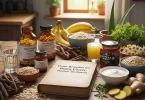Waking up with a sharp, stinging pain in your mouth is a small but significant annoyance. That jolt of pain when you sip coffee or brush your teeth is the classic sign of a canker sore, locally known in the Philippines as singaw.
- 🔎 What Triggers an Outbreak?
- 🍯 Top 8 Proven, High-Quality Home Remedies for Singaw
- 1. Saltwater Rinse: The Classic and Trusted Remedy
- 2. Baking Soda Paste: The Alkaline Soother
- 3. Honey: Nature’s Gentle Healer
- 4. Probiotic-Rich Yogurt: Healing From the Inside
- 5. Milk of Magnesia: The Protective Barrier
- 6. Clove Oil: Instant Numbing Relief
- 7. Hydrogen Peroxide Rinse: Deep Cleaning Support
- 8. Ice: Fast-Acting Pain Relief
- 📋 Quick Guide: Singaw (Canker Sore) Home Remedies
- 🏁 Conclusion: Taking Control of Your Oral Health
- ❓ Frequently Asked Questions (FAQs)
Unlike cold sores (which are viral and appear on the lips), canker sores are shallow, non-contagious ulcers found inside the mouth—on the cheeks, gums, or under the tongue. While they make eating and talking difficult, the good news is that relief is usually found right in your kitchen.
This guide covers the causes, proven home remedies, and lifestyle changes you need to manage and prevent these painful outbreaks.
🔎 What Triggers an Outbreak?
To prevent singaw, you first need to understand what triggers it. While the exact cause varies from person to person, research points to several common culprits:

- Physical Trauma: This is the most common trigger. It includes accidental bites, aggressive brushing, ill-fitting dental braces, or even eating sharp foods like chips that scrape the mouth’s lining.
- Dietary Triggers: Acidic foods (citrus, tomatoes, pineapples) and spicy or salty snacks can irritate the mouth. Additionally, some people react to Sodium Lauryl Sulfate (SLS), a foaming agent found in many toothpastes.
- Stress and Hormones: Mental stress weakens the immune system, making the mouth more susceptible to sores. Hormonal changes, such as those during menstruation, are also linked to outbreaks.
- Nutritional Deficiencies: A lack of Vitamin B-12, Folate, Iron, or Zinc can make the oral lining thinner and harder to heal.
🍯 Top 8 Proven, High-Quality Home Remedies for Singaw

1. Saltwater Rinse: The Classic and Trusted Remedy
A warm saltwater rinse remains one of the simplest yet most effective ways to soothe singaw. Salt naturally helps clean the sore and reduce bacteria in the mouth. When mixed with warm water, it calms inflammation, eases stinging, and promotes faster healing.
How to Use It:
– Mix 1 teaspoon of table or sea salt into half a cup of warm water.
– Swish the solution gently in your mouth for 30–60 seconds, making sure it reaches the sore.
– Spit it out afterward—don’t swallow it.
– Repeat 3–4 times a day, especially after meals and before you sleep.
2. Baking Soda Paste: The Alkaline Soother
Baking soda helps neutralize the acidity inside the mouth that worsens singaw pain. Because it’s alkaline, it reduces irritation and creates a temporary protective film over the sore, helping shield it during meals.
How to Use It:
– Mix a small pinch of baking soda with a few drops of water until it forms a thick, spreadable paste.
– Dab the paste directly on the singaw using a clean finger or cotton swab.
– Expect a mild sting at first—this is normal.
– Reapply 3–4 times daily for best results.
3. Honey: Nature’s Gentle Healer
Honey is a natural antibacterial and anti-inflammatory ingredient that can speed up the healing of singaw. It moisturizes the wound and helps reduce redness, swelling, and discomfort. Raw honey or Manuka honey gives the best benefits, but any pure, unprocessed honey works.
How to Use It:
– Place a generous amount of honey directly on the sore.
– Apply 4–5 times daily, especially after eating and right before bedtime.
– Let the honey sit on the spot as long as possible for deeper relief.
4. Probiotic-Rich Yogurt: Healing From the Inside
Yogurt with live cultures helps rebalance the body’s good bacteria. This supports immunity and can make the mouth less prone to inflammation. The cool, creamy texture also feels soothing when singaw is painful.
How to Use It:
– Eat 1–2 cups of plain yogurt daily.
– Make sure it contains “live and active cultures.”
– Avoid sugary or flavored yogurts because they can irritate the sore.
– Optional: Apply a small dollop directly on the singaw as a cooling coat.
5. Milk of Magnesia: The Protective Barrier
Milk of Magnesia helps by neutralizing acids in the mouth and leaving a thin, protective coating over the sore. This shield minimizes friction from food and talking, giving the singaw time to heal without irritation.
How to Use It:
– Shake the bottle well.
– Dip a cotton swab into the liquid and gently apply it to the sore.
– Keep your mouth open briefly to let it dry into a film.
– Use 3–4 times daily or before meals to reduce pain.
6. Clove Oil: Instant Numbing Relief
Clove oil contains eugenol, a natural anesthetic used for dental pain. It can quickly numb the singaw area while also helping keep bacteria at bay. Because it’s strong, it must be diluted before applying.
How to Use It:
– Mix 1–2 drops of clove oil with 1 teaspoon of a carrier oil (such as coconut or olive oil).
– Apply the mixture directly to the sore using a cotton swab.
– You’ll feel a warm sensation followed by noticeable pain relief.
– Do not swallow and stop if it causes irritation.
7. Hydrogen Peroxide Rinse: Deep Cleaning Support
Hydrogen peroxide helps clean the sore by removing debris and stopping bacteria from multiplying. A properly diluted solution can disinfect the area and prevent the singaw from worsening.
How to Use It:
– Use only a 3% hydrogen peroxide solution.
– Dilute it with equal parts water (1:1 ratio).
– Apply using a cotton swab or use it as a brief mouth rinse for 15 seconds.
– Always rinse with plain water afterward.
– Use only once or twice a day.
8. Ice: Fast-Acting Pain Relief
Ice doesn’t heal the sore, but it provides immediate comfort by numbing the area and reducing swelling. It’s especially helpful for fresh, newly formed singaw that are throbbing or burning.
How to Use It:
– Gently place ice chips or a small ice cube against the sore.
– Let it melt slowly in your mouth.
– Avoid chewing ice to prevent further irritation.
– A cloth-wrapped ice cube can also be pressed gently on the lip or cheek near the sore.
📋 Quick Guide: Singaw (Canker Sore) Home Remedies
| Remedy | Kaise Kaam Karta Hai (Action) | Istamal Ka Tariqa (How to Use) |
| Saltwater Rinse | Disinfect karta hai aur sujan (swelling) kam karta hai. | 1 tsp namak ko aadha cup gungunay pani mein milayen aur 30 second tak kulla karein. |
| Baking Soda Paste | Mun ki acidity ko khatam karta hai jo jalan paida karti hai. | Thora sa baking soda aur pani mila kar paste banayen aur seedha zakham par lagayen. |
| Honey (Shehad) | Bacteria ko rokta hai aur zakham bharta hai. | Din mein 4-5 baar seedha zakham par lagayen (khas tor par soney se pehle). |
| Yogurt (Dahi) | Probiotics (good bacteria) immune system ko behtar karte hain. | Rozana 1-2 cup plain dahi khayen (live cultures wala). |
| Milk of Magnesia | Zakham par aik protective layer banata hai. | Cotton bud se thora sa zakham par lagayen aur sookhne dein. |
| Clove Oil (Long ka Tel) | Dard ko sunn (numb) kar deta hai. | Dilute karein: 1-2 qatray kisi aur tel (jaise olive oil) mein mila kar lagayen. |
| Hydrogen Peroxide | Strong antiseptic hai jo safayi karta hai. | Pani ke sath barabar mikdar (1:1) mein mila kar zakham par lagayen. Niglein mat. |
| Ice (Baraf) | Dard aur sujan ko fori taur par kam karta hai. | Baraf ka tukra zakham ke qareeb rakh kar pighlne dein. |
🏁 Conclusion: Taking Control of Your Oral Health
Living with recurrent singaw can be incredibly taxing on your daily life, turning simple joys like eating and chatting into painful chores. However, it doesn’t have to be a permanent struggle. By shifting from a passive sufferer to an active manager of your health, you can significantly reduce how often these outbreaks occur and how long they last.
The key lies in a holistic approach:
- Identify your triggers: Whether it’s stress, sharp foods, or a new toothpaste.
- Act fast: Use accessible home remedies like saltwater rinses or honey the moment you feel that familiar stinging sensation.
- Nurture your body: Prioritize sleep, hydration, and a nutrient-rich diet to build a resilient immune system.
Remember, consistency is the ultimate cure. With the knowledge in this guide, you are now equipped to tackle singaw head-on and reclaim your pain-free smile.
❓ Frequently Asked Questions (FAQs)
Q1: Is Singaw (Canker Sore) contagious? A: No, absolutely not. Unlike cold sores (fever blisters) which are caused by a virus and are highly contagious, canker sores are not infectious. You cannot pass them to others through kissing or sharing utensils
2: What is the difference between a Canker Sore and a Cold Sore? A: This is a common confusion.
- Canker Sores (Singaw): Occur inside the mouth (cheeks, tongue, gums). They act like open ulcers and are not contagious.
- Cold Sores: Occur outside the mouth, usually on the lips or corners of the mouth. They are fluid-filled blisters caused by the Herpes Simplex Virus (HSV-1) and are contagious.
Q3: Can I “pop” a canker sore to make it heal faster? A: No! You should never try to squeeze, pop, or scrape a canker sore. Unlike a pimple, a canker sore is an open ulcer (a loss of tissue). Prodding it will only cause more tissue damage, increase the pain, and potentially lead to a bacterial infection.
Q4: Why do I keep getting them (Recurrent Aphthous Stomatitis)? A: If you get them frequently, it is often due to a combination of factors. The most common reasons for recurrence are chronic stress, a diet high in acidic or spicy foods, or a deficiency in vitamins like B-12, Zinc, or Iron. Using a toothpaste with Sodium Lauryl Sulfate (SLS) is also a frequent hidden cause.
Q5: How long does it take for a singaw to go away? A: Without treatment, a typical minor canker sore can be painful for 7–10 days and takes about 1–2 weeks to heal completely. With the remedies mentioned above, you can often reduce the painful period to just a few days.







